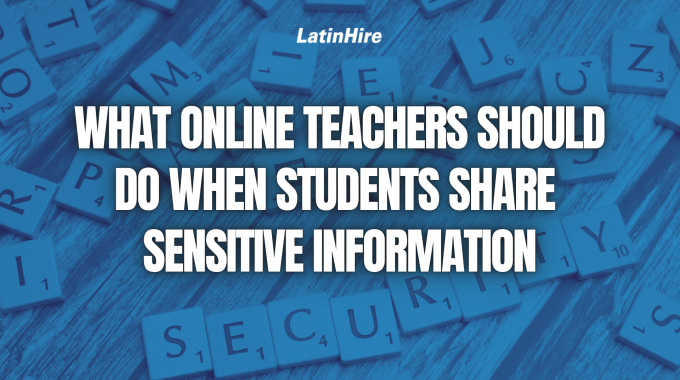Last week, we introduced five graphic organizers you can use with your online students to…

What Online Teachers Should Do When Students Share Sensitive Information
As online teachers, we often build strong connections with our students, especially if they’ve been learning with us for a long period of time. Sometimes, these connections may lead to students opening up and sharing personal details about their lives. While this trust is a positive sign of rapport, it can also place you in a difficult position, especially if the information suggests that the student may need extra support or intervention.
How can you help your students while avoiding playing the full role of a therapist or counsellor? Here are some tips on how to handle these situations professionally and compassionately.
1) Stay Calm and Listen

If a student shares something private and sensitive, avoid reacting with shock or judgement. Instead, listen attentively and acknowledge what they’ve said. Your role isn’t to interrogate or offer solutions, but to create a safe, respectful space for your students to feel comfortable talking about different subjects.
For example, if a student mentions being stressed at home, you may say, “I hear you. That sounds really challenging.”
2) Respect Their Privacy and Know Your Limits
Students may expect confidentiality, but teachers (even online ones) also have professional responsibilities. If the information is harmless, for example, involving family dynamics or small complaints, you can keep it private.
If the student is a minor and the information involves harm, abuse, neglect, or self-harm, you may be required by law or by your teaching platform’s policies to report it. If the student is an adult, gently encourage them to consider reaching out to a qualified professional who can provide the right support.
3) Offer Support Within Your Role

Even if you’re not a qualified therapist or counsellor, you can show empathy and provide encouragement to your students. Oftentimes, when others confide in us, they just want to hear us acknowledge their feelings. So you can say to your student, “That sounds really tough. Thank you for trusting me with that.” You can also offer uplifting words, such as, “You’re doing a great job staying focused on your studies despite everything going on.”
If you find that what your student shared is beyond your scope, you can redirect them to helpful resources, if appropriate, such as school counsellors, support services, or trusted adults.
4) Document the Interaction
If the information presented to you could require extra attention, write down what was said, when, and how you responded. This record helps if you need to escalate the matter to your online school, platform, or support team. It also ensures you don’t misremember details later.
Once you sense something is off, you may even want to record the conversation with a separate device, so you have proof of what was being said.
5) Set Boundaries Gently

Your students may sometimes overshare or confide in ways that blur professional boundaries. It’s okay to set limits politely and to stress your role and responsibilities. For example, you could say, “I really appreciate that you feel comfortable sharing about this with me. I’m here to support you in your learning, and if you ever need more personal support, I encourage you to talk with a counselor or a professional who’s more qualified to help.”
6) Escalate When Necessary
If you believe the student is in danger or the situation is beyond your ability to support, contact your school or platform lead and begin the reporting procedures immediately. If you’re an independent online teacher, contact the relevant authorities in the student’s location if it’s urgent. Remember, student safety always comes first.
We hope you found this article insightful. Share this post with your online teacher friends so they can be more prepared to deal with these situations as well.



